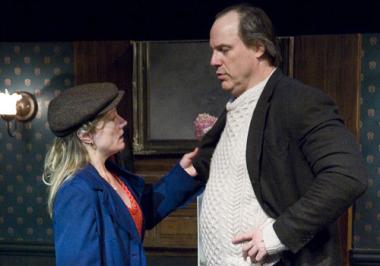Shakespeare & Company isn’t only about Shakespeare, but the contemporary plays that comprise nearly half of this summer’s program share some common ground with the Bard. They are smaller works than Shakespeare’s sprawling masterpieces—of necessity, in these shallow-pocket times—but they, too, are rich in language, character, ideas and dramatic energy.
Two of the non-Shakespeares I caught recently have things in common with each other, too. Both Sea Marks, by Gardner McKay, and The Taster, a world premiere by Joan Ackermann, are about words and writing, about translation and transformation, about the barriers to communication. Both also contain metaphors of separation and connection, one over distance, the other through time. And in both, two physical locations share the same stage.
Sea Marks is a bittersweet two-character drama about two people with practically nothing in common but loneliness. Colm is a fisherman living in a stone cottage on a sea-wracked island off the Irish coast; Timothea is a publisher’s assistant in the city of Liverpool. They met when she came to a relative’s wedding in his village, and when he writes her a shy, halting letter afterward, it begins a correspondence that leads to a tentative relationship.
Their connection is strained, from the beginning, by distance—cultural as well as geographic. They come from different worlds, almost different centuries, and are strangers in each other’s spheres. The piece turns on connections to place, and how those nourish, define and limit us. The performers—Walton Winston, earnest and artless as Colm; Kristin Wold, precise and ironic as Timothea—have a marvelous converse chemistry, though Daniela Varon’s direction misses a lot of detail in the interactions.
Sea Marks takes place in the 1960s and its between-scenes soundtrack is the Beatles. The Taster is set—or half-set—in the early 1500s, with Scott Killian’s original music setting the late-medieval mood. The title character is Octavio, servant to the Basque king, whose job it is to test his paranoid majesty’s food for poison. In Rocco Sisto’s deliciously sensual performance, Octavio is part monkish ascetic and part voluptuary, a gourmet of the sights and sounds, smells and tastes of the natural world.
The hot-headed king (Tom O’Keefe) is childless and blames his queen (Maureen O’Flynn), though he shuns her bed, and she comes to Octavio for help and comfort. Alternating with these scenes is a modern parallel, performed by the same actors (there’s a cast of five altogether), in which a New York couple wrestle with their own arid marriage. He’s a would-be writer with writer’s block who is suspicious of his more successful wife’s fidelity. Incapable of attempting anything original, he’s translating a 16th-century Basque drama about& the king’s taster.
There are wrinkles in this time warp. Sometimes characters from the two periods share the stage and at moments are vaguely aware of each other’s presence. The structure is fascinating and yields a plethora of motifs and metaphors: translation (delving for meaning in antique texts and in here-and-now conversations), food as healer and killer, music as power, fecundity in nature and humanity.
The cast, in Tina Packer’s imaginative staging, handle their split duties admirably. Many of the playwright’s thematic conjunctions are felicitous, some a bit forced, but the whole is a satisfying stew that lingers on memory’s palate.
Shakespeare & Company, through Sept. 4, 70 Kemble St., Lenox, (413) 637-3353, shakespeare.org.



